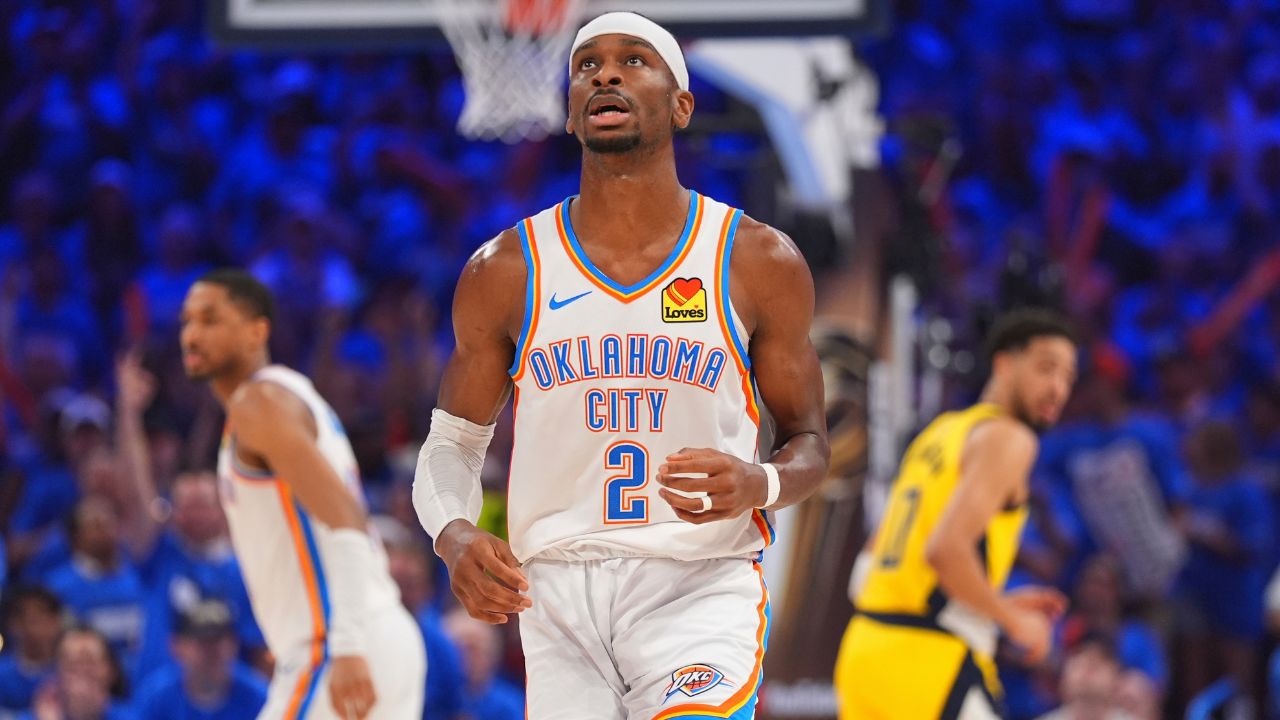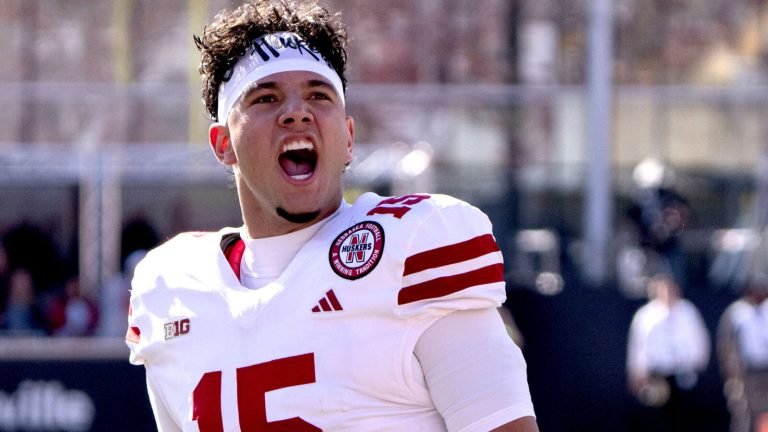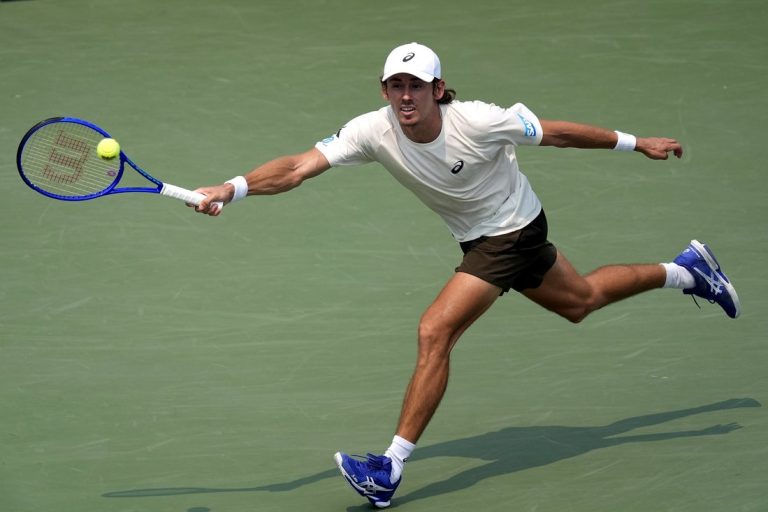INDIANAPOLIS — There is still room for improvement.
On Thursday night, the Thunder will take the floor against the host Indiana Pacers with a chance to win an NBA title. Should they stumble, they’ll get a second chance on Sunday at home at the Paycom Center, where they have lost just eight times this season, playoffs included.
In normal circumstances, a resume like this one — a pending title following a league-best 68-win season in the Thunder’s case, or in Gilgeous-Alexander’s, three straight first-team All-NBA nods, an MVP award and quite likely a Finals MVP award if the Thunder do close out the Pacers — would suggest a finished product, a peak.
But the Thunder and Gilgeous-Alexander are just figuring this stuff out on the fly.
If they win the championship either Thursday or Sunday, the Thunder will be the youngest team by average age to win an NBA title since the Portland Trail Blazers in 1977. They have one rotation player — Alex Caruso — 30 or older, and the average age of the top eight players in their post-season rotation is 24.9.
That, combined with the tenaciousness of the Pacers’ defensive effort through much of the series, explains why the Thunder have only occasionally looked like the 68-win juggernaut that decimated the NBA in the regular season, when, in addition to their league-leading defence, their 119.2 offensive rating was third.
In the Finals, the Thunder are generating just 115.6 points per 100 possessions and their effective field goal percentage is a relatively pedestrian 50.8, compared with 56.0 during the regular season.
So there is still work to be done, and still some upside to mine.
That’s the mindset that Thunder head coach Mark Daigneault was preaching to his young team after OKC took a 3-2 lead in the Finals with their 120-109 win over the Pacers on Monday night.
“It wasn’t a perfect game at all,” he said. “There’s a lot of room for growth. But I thought our improvement from Game 4 [where the Thunder needed a late fourth-quarter comeback to win in Indiana and avoid going down 3-1] to Game 5 was critical. We’re going to need a similar type of approach. We got to take the humility to understand there’s still a lot we can get better at if we want to go on the road and win [an elimination] game.”
One of the most significant areas of improvement for OKC was in their ball movement. In their two losses in the series, they’ve assisted on barely a third of their made field goals, managing just 29 assists on 83 made shots in Games 1 and 3 combined. And while they won Game 4, they assisted on just 11 of their 34 made shots.
In Game 5, the ball moved much more sharply, and they accumulated 24 assists on 34 made shots, similar to the 25 assists on the 37 makes in Game 2, their other most convincing win in the series.
Leading by example in both respects has been Gilgeous-Alexander, who is a star with no significant flaws, but sometimes struggles finding the perfect balance between aggressively hunting his own shot and creating opportunities for his teammates.
He had 10 assists in Game 5 and eight in Game 2. In the other three games, he’s managed just seven assists total, including none in the Thunder’s Game 4 win in Indianapolis. Steve Nash would never.
“Yeah, it was for sure better,” Gilgeous-Alexander said of the Thunder’s offensive approach after Game 5, a game in which he also had 31 points, four blocked shots and two steals. “Ball moved a little bit more. We were more aggressive. We were in the paint making decisions. Yeah, we were good.”
Which team dictates the action in Game 6 could determine a winner.
So far in the series, the Pacers have, arguably, played closer to their identity, or at least their regular-season standard. Indiana was second in the NBA in passes per game (330.5) in the regular season and 10th in potential assists per game (48.6), and in the Finals, they are averaging 335.6 passes per game and 46.6 potential assists.
Their challenge in that regard could be the health of their offensive engine, Tyrese Haliburton, who suffered a calf strain early in Game 5 and was ineffective the rest of the way. The expectation is he will play in Game 6, but how much he resembles the clever passer who averaged 9.2 assists per game during the regular season could determine the series.
Meanwhile, the Thunder’s offence has been more gluey as they are averaging just 216 passes per game — 70 less than their season average — and only 34.2 potential assists, a steep drop from their regular-season standard (47.3).
“That’s one of the things we do have to adjust as we move forward in the series, is create more outlets for the ball so that we can make those plays and get higher quality shots,” said Daigneault before his team did just that in Game 5. “I don’t think our floor game in Game 4 was a sustainable way to expect to win a series. We have to play better than that on both ends of the floor for much more of the game than we did. We were fortunate to win that one.”
Gilgeous-Alexander’s scoring down the stretch in Game 4 — he put up 15 of the Thunder’s final 16 points in a late-game takeover that evened the series — was a big reason they did.
But in Game 5, it was his determination to create opportunities for his teammates that may have been the difference. Seven of his 10 assists were for wide-open threes created when he drove to the rim and kicked to shooters as the defence collapsed, another came on a kick-ahead pass for a transition three and one more came as he passed out of a trap to an open three-point shooter. Three more times he drove and kicked it out, and the Thunder swung the ball for an open three. In all, Gilgeous-Alexander had the primary or secondary assist on 10 of the Thunder’s 14 made threes in Game 5.
Gilgeous-Alexander’s signature is that of a high-volume scorer; he’s incredibly efficient because he’s an excellent finisher, precise mid-range shooter and an expert at getting to the free-throw line. In the past 40 years, the only other player to have a season scoring at least 2,400 points with a True Shooting percentage (which reflects his two-point shooting, three-point shooting and free-throw shooting) of .630 or better was 25-year-old Kevin Durant in 2013-14 when he won his lone MVP award.
Put simply, it’s always a good play for Gilgeous-Alexander to try to score. But sometimes finding opportunities for his teammates can pay dividends, too. Not that he’s an unwilling passer — that he has averaged a relatively modest six assists over the past three years, in which he’s emerged as an MVP contender, is in part because he will give the ball up early in possessions without complaint.
“A lot of the [passes] he throws, the nature of a lot of those plays, because of the way he gets guarded a lot of the time, he’s thrown early passes that are not necessarily assist-type plays,” says Daigneault.
Gilgeous-Alexander says he’s just trying to read the game on the fly, typically against defences that have tilted the floor to try and contain his downhill attacks.
“Every night you — me personally — try to attack the defence,” Gilgeous-Alexander said after accumulating eight assists in the Thunder’s win in Game 2, which followed him putting up 30 shots and generating just three assists in OKC’s loss in Game 1. “You try to just make the right play. You try to make them pay for what they throw at you, coverage-wise, scheme-wise.
I think tonight, myself for sure, did a better job of attacking it … We were a little bit sticky [Game 1]. You have games like that.”
The scary thing for the rest of the NBA is that at 26 years old and in his sixth season, it stands to reason that Gilgeous-Alexander will only get better at finding the right balance between leveraging his ultra-efficient scoring and using the attention he generates to create opportunities for his teammates and the knock-on effects of that. It’s already been shown in this series how much of an impact that approach can have.
“He’s getting better every year in just about everything,” says Daigneault. “I think he’s really improved as a playmaker … and then he’s an unbelievable scorer, and incredibly efficient. We lean into that. He leans into that. [But] he’s learned when teams load up on him and they overcommit, to get off it early, and I think that’s reflected in the way we’ve played offence throughout the course of the season.”
The youngest team in the NBA winning a championship while its still young superstar is still learning how to best use his superpower as a scorer to create opportunities for his teammates can only be a sobering thought for the rest of the league.



![[WATCH] CM Punk apologizes to WWE fans in a heartbreaking moment after SummerSlam 2025 goes off the air](https://joelgalvan.site/wp-content/uploads/2025/08/703ce-17541849273705-1920-768x480.jpg)


